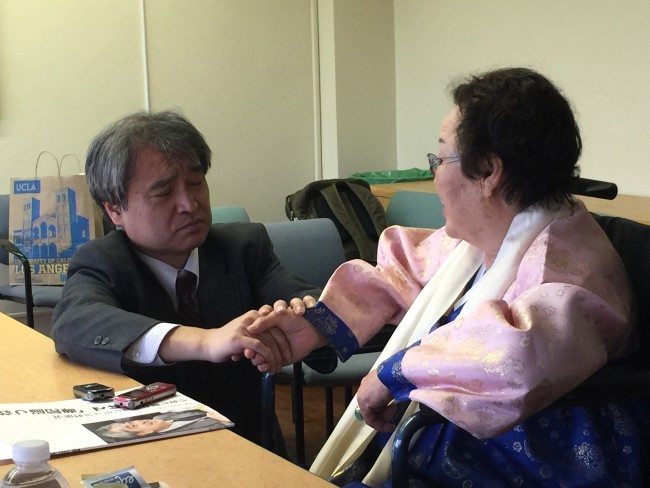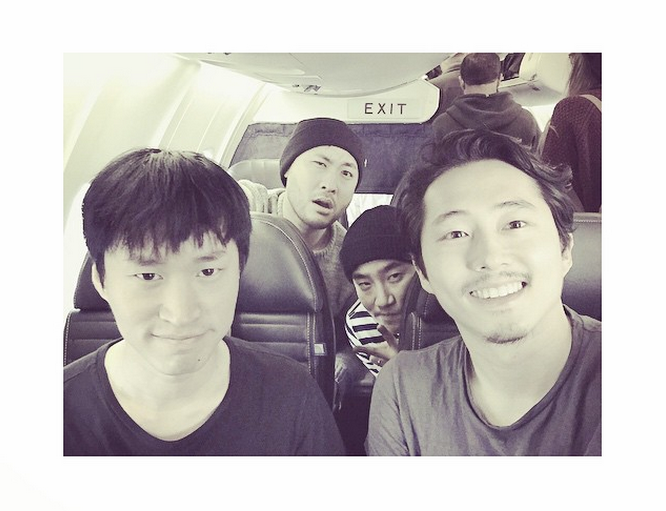Pictured above: Takashi Uemura greets Grandma Lee before his talk May 8 at UCLA co-sponsored by the Center for Korean Studies and the Terasaki Center for Japanese Studies. (Photo courtesy of Korean American Forum of California)
by SUEVON LEE | @suevlee
editor@charactermedia.com
At age 57 and with graying hair, Takashi Uemura is considerably older than his 33-year-old self who in 1991 penned two articles in Japan’s second-largest newspaper about a Korean comfort woman who was the first to come forward and publicly tell her story about Japan’s wartime abuse.
All these years later, the fiery spirit in the former journalist has not subsided.
That much was clear when the Sapporo resident came to UCLA’s Perloff Hall on May 8 to deliver a presentation to a packed room about the smear campaign that is being waged against him and other liberal media by Japan’s political conservatives over the country’s culpability for the forced prostitution of approximately 200,000 women from Korea and other Asian countries in military brothels before and during World War II.
“I will fight. I cannot lose this fight,” said the former journalist, dressed in a gray suit and who gestured frequently to illustrative slides on the projector screen.
 Uemura points to a slide featuring an article about him in a Japanese newspaper at his colloquium at UCLA’s Perloff Hall. (Photo courtesy of Korean American Forum of California)
Uemura points to a slide featuring an article about him in a Japanese newspaper at his colloquium at UCLA’s Perloff Hall. (Photo courtesy of Korean American Forum of California)
Los Angeles was Uemura’s last stop on a five-city U.S. tour that began April 30 in Chicago and which has taken him to Milwaukee, New York City and Princeton, N.J. to speak about his crusade to combat the backlash.
Twenty-four years ago, Uemura, then a reporter for the Asahi Shimbun, wrote about Kim Hak-sun, who was the first so-called “comfort woman” to provide recorded testimony about being forced to service Japanese officers at a military outpost in southern China. Her testimony helped bring greater attention to the issue of forced sexual enslavement of these women, nearly 50 years after the fact.
Today, Uemara’s articles have come under renewed attack by some members of Japan’s political right who dispute that Japan forced the women into prostitution and are calling for the Japanese government to revise a 1993 apology and statement acknowledging the existence of comfort stations and the coercive nature of their operations.
Speaking through a translator May 8, Uemura, who retired from journalism and is now a lecturer of social issues at Hokusei Gakuen University, says the attacks against him in conservative publications and on the Internet have cost him one teaching post, threaten his current position and have been aimed at his 17-year-old daughter.
 Takashi Uemura’s Colloquium: Reporting on “Comfort Women,” held May 8 at UCLA’s Perloff Hall, drew a full crowd. (Photo courtesy of Soo Yeon Kwak)
Takashi Uemura’s Colloquium: Reporting on “Comfort Women,” held May 8 at UCLA’s Perloff Hall, drew a full crowd. (Photo courtesy of Soo Yeon Kwak)
Rather than retreat, Uemura has embarked on a global awareness campaign of sorts, visiting American universities to explain why he’s taking a stand against these forces: “Attacking my articles as ‘fabrication’ is tantamount to a denial of the comfort woman issue,” states one slide from his presentation. “It hurts the dignity of the former ‘comfort women’ halmoni who were courageous enough to recount their painful experiences.”
Earlier this year, Uemura filed defamation suits against Tsutomu Nishioka, a professor of Korean studies at Tokyo Christian University, and Bungeishunju, the publisher of the weekly magazine Shukan Bunshun, for alleging that he fabricated the 1991 articles.
“There are forces in the Japan of 2014 that attack and intimidate those who try to fix their gaze upon the dark side of history. There are also people who refuse to surrender and are raising their voices. My younger self seems to be telling me, ‘Go stand with them and confront those forces,’” Uemura wrote in a piece published in the January 2015 issue of Bungei Shunju magazine.
 Grandma Yong Soo Lee with Rep. Ed Royce at the 22nd annual Center for Asian Americans United for Self Empowerment (CAUSE) dinner held May 7 at the Westin Bonaventure in Downtown L.A. (Photo courtesy of Soo Yeon Kwak)
Grandma Yong Soo Lee with Rep. Ed Royce at the 22nd annual Center for Asian Americans United for Self Empowerment (CAUSE) dinner held May 7 at the Westin Bonaventure in Downtown L.A. (Photo courtesy of Soo Yeon Kwak)
In attendance at Uemura’s talk at UCLA was Yong-soo Lee, one of only a few dozen surviving comfort women who traveled to the U.S. from her home in Taegu, South Korea, to overlap with Japanese Prime Minister Shinzo Abe’s visit to Washington, D.C. in late April.
Lee was invited to Washington by Rep. Mike Honda (D-Calif.), who in 2007 proposed House Resolution 121, which calls for Japan to formally acknowledge and apologize to former comfort women; publicly refute any claims that the sexual enslavement never occurred; and include lessons from the wartime abuse in school curriculums.
Lawmakers, Korean American groups and others hoped that Abe, whose conservative administration has sought to dilute Japan’s 1993 apology, known as the “Kono Statement,” would use his high-profile address to a joint session of Congress to issue a formal apology; that did not happen.
Speaking through interpreter Phyllis Kim, executive director of the Korean American Forum of California, after the UCLA talk, Lee told KoreAm she went to Washington as “a living witness of history.” “I wanted to show [Abe] the clear proof,” she said, adding that she wanted to see the Japanese leader make a formal apology in person.
 Yong-soo Lee with members of California’s congressional delegation at the 22nd annual CAUSE dinner held May 7. (Photo courtesy of Soo Yeon Kwak)
Yong-soo Lee with members of California’s congressional delegation at the 22nd annual CAUSE dinner held May 7. (Photo courtesy of Soo Yeon Kwak)
Dressed in a traditional hanbok, the 86-year-old Lee stood at the front of the room after Uemura’s presentation at UCLA and briefly addressed the audience gathered for the May 8 event, which was sponsored by the Terasaki Center for Japanese Studies and Center for Korean Studies. The night before, Lee was a guest at the 22nd annual Center for Asian Americans United for Self Empowerment (CAUSE) dinner in downtown L.A., attended by members of California’s congressional delegation, including Judy Chu (D-Calif.), Ed Royce (R-Calif.), Ted Lieu (D-Calif.) and state legislators.
Of her trip overall in the U.S., Lee said, “I felt my heart was breaking to see so many people trying so hard at making a lot of efforts to resolve this issue in the United States.”
___







